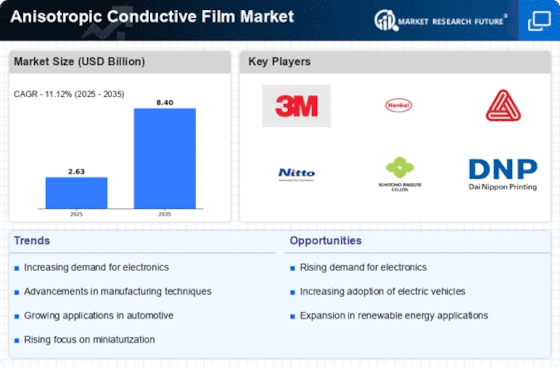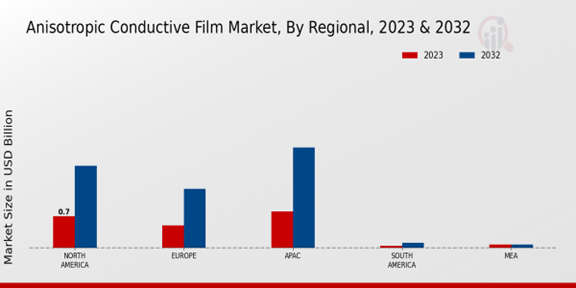The Anisotropic Conductive Film Market is characterized by a dynamic competitive landscape that reflects the rapid advancements in technology and the increasing demand for efficient electronic materials. As industries such as consumer electronics, automotive, and telecommunications expand, manufacturers within this market are striving to enhance their product offerings to cater to varying applications. The market is witnessing innovations driven by the need for better performance in terms of efficiency, reliability, and overall functionality. This evolution is accompanied by strategic partnerships, mergers, and acquisitions as companies strive to consolidate their market presence and bolster their competitive edge.
The competitive insights within this realm reveal a plethora of opportunities and challenges as organizations navigate the complexities associated with technological integration and sustainability.Nitto Denko has established itself as a key player in the Anisotropic Conductive Film Market through its focus on innovation and product quality. The company’s strengths lie in its extensive experience in adhesive technologies and diverse application expertise, which allows it to provide tailored solutions that meet the specific needs of various sectors.
With a strong emphasis on research and development, Nitto Denko continuously invests in developing advanced anisotropic conductive films that facilitate high connectivity and improve performance metrics in electronic devices. This commitment to innovation has enabled the company to maintain a competitive edge as it leverages its capabilities to cater to emerging trends such as miniaturization and enhanced durability.
Additionally, Nitto Denko's robust distribution network and strategic collaborations further enhance its market presence and ensure widespread accessibility of its products across different regions globally.Hitachi's footprint in the Anisotropic Conductive Film Market is reinforced by its commitment to technological advancements and high-quality production standards. The company capitalizes on its broad industry experience and extensive knowledge base to deliver anisotropic conductive films that meet the rigorous demands of modern electronics. Hitachi emphasizes sustainability and eco-friendliness in its production processes, aligning its offerings with the growing environmental consciousness among consumers and industries alike.
Furthermore, Hitachi's adeptness in responding to market trends and customer needs contributes significantly to its strong market position. The company's extensive research capabilities and investment in cutting-edge technology facilitate the continuous improvement of its product line, enabling it to capture new market opportunities and maintain strong relationships with clients seeking reliable electronic components. As Hitachi continues to drive innovation in this sector, it solidifies its role as a formidable contender in the competitive landscape of the anisotropic conductive film market.





















Leave a Comment